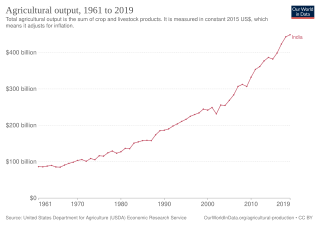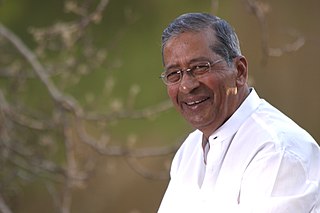
Mankombu Sambasivan Swaminathan is an Indian agronomist, agricultural scientist, plant geneticist, administrator and humanitarian. Swaminathan is a global leader of the green revolution. He has been called the main architect of the green revolution in India for his leadership and role in introducing and further developing high-yielding varieties of wheat and rice. Swaminathan's collaborative scientific efforts with Norman Borlaug, spearheading a mass movement with farmers and other scientists and backed by public policies, saved India and Pakistan from certain famine-like conditions in the 1960s. His leadership as Director General of the International Rice Research Institute (IRRI) in the Philippines was instrumental in his being awarded the first World Food Prize in 1987, recognized as the Nobel or the highest honours in the field of agriculture. United Nations Environment Programme has called him 'the Father of Economic Ecology'.

The history of agriculture in India dates back to the Indus Valley Civilization. India ranks second worldwide in farm outputs. As per 2018, agriculture employed more than 50% of the Indian work force and contributed 17–18% to country's GDP.

The Ministry of Agriculture & Farmers Welfare, formerly the Ministry of Agriculture, is a branch of the Government of India and the apex body for formulation and administration of the rules and regulations and laws related to agriculture in India. The three broad areas of scope for the Ministry are agriculture, food processing and co-operation. The agriculture ministry is headed by Minister of Agriculture Narendra Singh Tomar. Abhishek Singh Chauhan, Krishna Raj and Parsottambhai Rupala are the Ministers of State. Sharad Pawar, serving from 22 May 2004 to 26 May 2014, has held the office of Minister of Agriculture for the longest continuous period till date.

Bhavarlal Hiralal Jain was an Indian entrepreneur, and the founder chairman of Jain Irrigation Systems Ltd. (JISL), now the second largest micro-irrigation company in the world. He was a staunch Gandhian and philanthropist. He was the founder of Gandhi Research Foundation.

Fishing in India is a major industry employing 14.5 million people. India ranks second in aquaculture and third in fisheries production. Fisheries contributes to 1.07% of the Total GDP of India. According to the National Fisheries Development Board the Fisheries Industry generates an export earnings of Rs 334.41 billion. Centrally sponsored schemes will increase exports by Rs 1 lakh crore in FY25. 65,000 fishermen have been trained under these schemes from 2017 to 2020. Freshwater fishing consists of 55% of total fish production.

Joypur is a community development block that forms an administrative division in the Bishnupur subdivision of the Bankura district in the Indian state of West Bengal.

G. V. Chalam, also known as Guduru Venkata Chalam (1909–1967), was an Indian activist and agricultural scientist who received the Padma Shri in 1967.
Madappa Mahadevappa, popularly known as Rice Mahadevappa was an Indian agricultural scientist and plant breeder, renowned for developing high yielding hybrid varieties of rice. He served for more than 55 years and had a glowing career. He served as the Vice-chancellor of University of Agricultural Sciences, Dharwad for two terms and his selfless hard work along with broad vision lead to the award of ICAR's SARDAR PATEL OUTSTANDING INSTITUTION award in the year 2000 to UAS, Dharwad. He served as chairman of Agricultural Scientists Recruitment Board under Indian Council of Agricultural Research of which he was a member of governing council. As chairman of ASRB, he introduced radical changes to create transparency in recruitment and expedited the process of promotions. This enhanced the talent pool at ICAR system to further contribute to the cause of the agriculture and farming community. He was the recipient of Padma Bhushan, India's third highest civilian honour, Padma Shri and various other accolades.
Ebrahimali Abubacker Siddiq is an Indian agricultural scientist, whose research in genetics and plant breeding is reported to have assisted in the development of various high-yielding rice varieties such as dwarf basmati and hybrid rice. The government of India honoured Siddiq in 2011 with the fourth-highest civilian award of Padma Shri.
Gutta Muniratnam was an Indian social worker, a member of the National Planning Commission of India and the founder of Rashtriya Seva Samithi (RASS), a non governmental organization engaged in the social welfare activities in over 2500 socio-economically backward villages in the Rayalaseema region, spread across the present day states of Andhra Pradesh and Telangana. He was honored by the Government of India, in 2012, with the fourth highest Indian civilian award of Padma Shri.
Krishnaswamy Ramiah, was an Indian agricultural scientist, geneticist, parliamentarian and the founder director of Central Rice Research Institute (CRRI), Cuttack, credited with introducing systematic hybridisation programmes in rice breeding in India. The Government of India honoured him in 1957, with the award of Padma Shri, the fourth highest Indian civilian award for his services to the nation and followed it up with the third highest civilian honour of the Padma Bhushan in 1970.
Atmaram Bhairav Joshi was an Indian agricultural scientist and academic, known for his contributions to the field of wheat and other crop breeding. He was the vice-chancellor of Mahatma Phule Krishi Viswavidyalaya, Rahuri and the chairman of the Research Advisory Committee of the Indian Agricultural Research Institute, New Delhi. The Government of India awarded him the fourth highest Indian civilian award of Padma Shri in 1975.
Gurcharan Singh Kalkat was an Indian agricultural scientist and the founder chairman of the Punjab State Farmers Commission (PSFC), known for his contributions in bringing the green revolution to Punjab. The Government of India awarded him the fourth highest Indian civilian honour of Padma Shri in 1981 and followed it up with the third highest Indian civilian award of Padma Bhushan in 2007.
Abdul Rauf Abdulkarim Shaikh is a progressive farmer, residing near Banavasi, Karnataka, India who is known for innovative cultivation of pineapple and he is conferred with honorary doctorate by University of Agricultural Sciences, Dharwad, for his achievement in horticulture.
Mangina Venkateswara Rao was an Indian agricultural scientist, plant breeder, geneticist and the chairman of the Agri Biotech Foundation. He was a former Vice Chancellor of the Acharya N. G. Ranga Agricultural University and a former Deputy Director of the Indian Council of Agricultural Research (ICAR). Rao, a recipient of the Norman Borlaug Award, was awarded the fourth highest civilian award of the Padma Shri, by the Government of India, in 1999.

Haji Kalimullah Khan, popularly known as Mango man, is an Indian horticulturist and fruit breeder, known for his accomplishments in breeding mangoes and other fruits. He is known to have grown over 300 different varieties of mangoes on a single tree, using grafting techniques. Born in Malihabad, near Lucknow in the Indian state of Uttar Pradesh, Khan dropped out of school at 7th standard and took to the family business of farming. Using the asexual propagation technique of grafting, he has developed several new varieties of mangoes, some of which has been named after celebrities and political leader such as Sachin Tendulkar, Aishwarya Rai, Akhilesh Yadav, Sonia Gandhi, Narendra Modi, Amit Shah etc. Anarkali, a variety of mango developed by him is reported to have two different skins and two different layers of pulp, each having a different taste. The Government of India awarded him the fourth highest civilian honour of the Padma Shri, in 2008, for his contributions to horticulture.
Jonnalagadda Gurappa Chetty is an Indian painter, craftsman and writer, known for his contributions for the revival of the Indian textile art form of Kalamkari. He is a recipient of honours such as Shilpaguru, Rasthriya Samman, Tulsi Samman and Kamaladevi Vishwa Karigar Award. The Government of India awarded him the fourth highest civilian honour of the Padma Shri, in 2008, for his contributions to Kalamkari art.

Chintala Venkat Reddy is an organic farmer known for his soil and nutrient management techniques in farming. He is the first independent farmer in India to receive an international patent for his technique in soil swapping and soil fertility.
Kanwal Singh Chauhan is an Indian farmer from Haryana, India. He is known for his contributions to crop diversification in the agriculture industry. In January 2019, he was awarded Padma Shri, India's fourth highest civilian award. He was honoured with N. G.Ranga Farmer Award 2010 by Indian Council of Agricultural Research in August 2011.
The Department of Agriculture and Farmers' Welfare (DA&FW) is one of the three constituent department of Ministry of Agriculture and Farmers' Welfare, the other two being Department of Agriculture Research and Education (DARE) and Department of Animal Husbandry and Dairying. The Department is headed by Minister of Agriculture and Farmers' Welfare.








